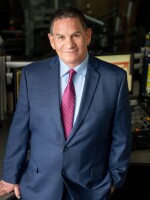He’s a man with an incredible story of survival.
"My name is David Lenga, and I'm a 95-year-old Holocaust survivor."
Lenga was just 11 when World War Two started. But, Lenga survived stays in two of Nazi Germany’s most infamous concentration camps, Auschwitz and Dachau. He said most of his family ended up being among the six million Jews who died in the Holocaust.
"From my father and mother's side...we consisted about 100 people," said Lenga. "When the war ended, my father and I were left. 88 of my family members perished in the Holocaust."
Lenga said as a young boy, he didn’t see the warning signs about the war clouds forming over Europe, or the antisemitism that Nazi Germany was spreading.
In September of 1939, he was on a street car, running an errand for his family. Suddenly, German planes attacked his hometown of Lodz. They machine gunned civilians. He said he'll never forget the blood which was everywhere.
Poland fell to Nazi Germany’s military with days. The occupying forces wasted no time in oppressing Poland’s Jews.
Lenga says his family was forced to move, and work at a plant making leather goods for the Nazis. But, two years later, all of the Jews in the town they were living in were rounded up, and loaded into rail cars. The destination was the infamous Nazi concentration camp Auschwitz.
Lenga admits he didn’t understand what was happening when they first arrived. One of the inmates told him to look at some smokestacks in the distance. The teen said he didn't know what it meant.. The inmate told him that was what would happen to him, and he would end up as ash coming from the crematorium.

Lenga said people went through the process known as selection, where those deemed healthy enough to work were sent in one direction, and those who were not were sent directly to the gas chambers.
He said he had to use his wits to survive. When he learned that 200 men had been picked to leave Auschwitz to do construction, he tried to pass himself off as a construction worker. The German said he was too young, and rejected him.
So, he helped carry some buckets of soup into the workers holding area. Lenga then blended into the group, and was able to leave the death camp with them.
After the war, Lenga ended up in Sweden, where he met his wife. They eventually moved to America.
Despite the painful memories, he feels it’s important to speak about what happened, especially to younger generations who don’t know about the Holocaust.
On International Holocaust Remembrance Day, he told his story to hundreds of schoolchildren from Ventura and Los Angeles Counties, as well as to visitors to the Ronald Reagan Presidential Library in Simi Valley.
The library is currently hosting a 12,000 square foot exhibition about the Auschwitz, which looks at the Holocaust through the lens of the death camp.
Lenga says there’s a powerful lesson from what happened: To not stand up against hate is to allow it to happen again. "It is something to be very frightened about," said Lenga. "It started with words...with poisoning words." He said hate has to be stopped before it turns from words into something more.



